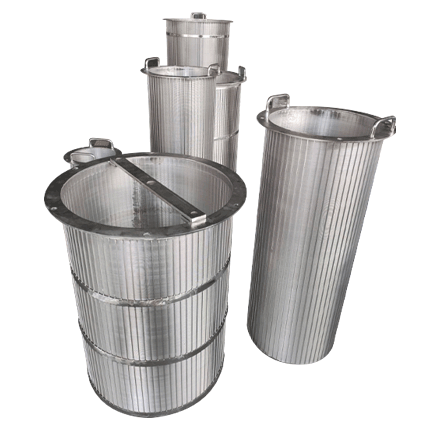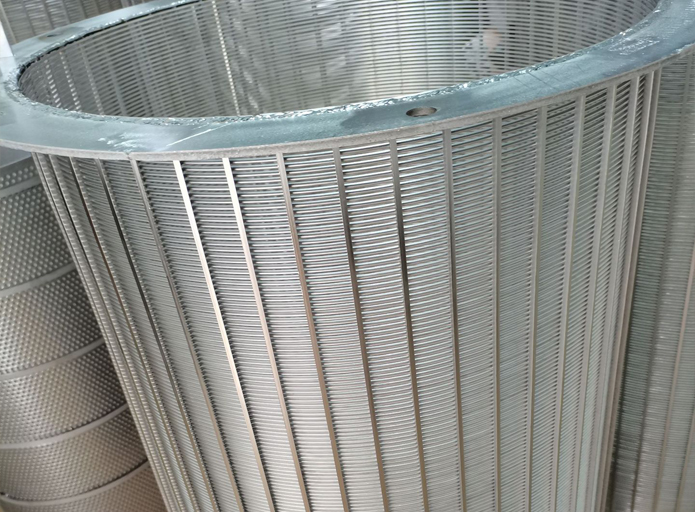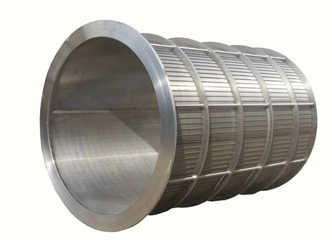In an era marked by the quest for efficiency and optimal performance, industries ranging from pharmaceuticals to electronics and petroleum have a common tool that greatly enhances their process efficacy- the Wedge Mesh Filter Elementhttps://www.xxfilter.com/.
The Wedge Mesh Filter Element is a specialized tool that adopts a stainless steel wedge wire welded screen, ensuring durability, enhanced filtering precision, and increased cost-effectiveness in various industry operations. Notably, the filtration precision offered by this extraordinary tool can range from 30 to 800 microns, providing flexibility to meet diverse application requirements.

True to its moniker, the Wedge Mesh Filter Element uses a wedge wire welded screen, an integration of stainless steel wedge wire and support bar, primarily in filter plates, filter baskets, cartridges and other products. Its unique construction with meticulous detail ensures that the final product features high strength, high hardness, wear resistance, and corrosion resistance. The even gap, excellent permeability, and easy cleaning and backwash characteristics elevate its functional value in various industries.
Applications of the Wedge Mesh Filter Element
The power of the Wedge Mesh Filter Element has been tapped by various industries including pharmaceuticals, food production, electronics, and the petroleum and chemical industry. The filtration media of the Wedge Mesh Filter Element manifest as water suspensions, particulate matter, water dirt, bacteria, algae, and rust.
In the pharmaceutical industry, for instance, the Wedge Mesh Filter Element ensures high purity standards by efficiently filtering out impurities during drug production processes. In the food industry, the filter element gives assurance by maintaining high hygienic standards.
Meanwhile, in the electronics industry, it helps maintain precision by keeping manufacturing processes clean and dust-free. The petroleum and chemical industry also enjoys the assurance of safety with the Wedge Mesh Filter Element ensuring that harmful impurities are effectively eliminated.
Unique Features and Principles of Operation
Interestingly, the Wedge Mesh Filter Element boasts of full-welded type construction, ensuring product integrity and the formation of the ideal seam size. A key distinction lies in the production process involved, which creates a smooth tube surface, devoid of production angles, and burrs.
An engaging feature of this filter element is its large filtration area conferring greater precision, leading to a higher flux. This high-efficiency feature effectively reduces equipment diameter, contributing to smaller footprints in factories.
Precision is another significant trait of the Wedge Mesh Filter Element boasting an impressive filtration precision of over 90% retention rate concerning filtration accuracy. Its excellent dirt retention helps extend the service life of the filter element.
The Wedge Mesh Filter Element Advantage
One distinctive competitive advantage of the Wedge Mesh Filter Element lies in its internal thread construction that significantly enhances pressure resistance. This filter element also demonstrates wide chemical compatibility, high flow capacity, and low differential pressure.
The lavish use of stainless steel in its production guarantees resilience, while the sparse outside and dense inside honeycomb structure provide a large dirt-holding capacity, setting a new industry standard.
Conclusion
The Wedge Mesh Filter Element, with its robust construction, superior material quality, innovative design, and commendable precision, stands as a tool that revolutionizes the filtration process across multiple industries. Its wide range of applications, impressive features, and unique advantages make it an indispensable asset for meeting diverse industrial filtration requirements. Stakeholders keen on improving their operational efficiency would do well to integrate this remarkable tool into their operations. It is a choice that guarantees a solid payback in terms of operational performance, cost-effectiveness, and overall productivity.
The Wedge Mesh Filter Element boasts an array of unique features and principles of operation that make it stand out among filter solutions in various industries.

Unique Features:
Full-welded Type Construction - This type of construction ensures strict continuous integrity of the product, making it particularly robust and sturdy. It results in products with high hardness and extreme wear resistance.
High Filtration Precision - The Wedge Mesh Filter Element offers a wide range of filtration precision, from 30 to 800 microns. This flexibility allows it to meet various application requirements and ensures a high retention rate in relation to filtration accuracy.
Material Quality - Predominantly, stainless steel is used in production, ensuring high strength and corrosion resistance. This contributes to the overall durability of the product.
Unique Structure - The filter adopts a sparse external compact internal, honeycomb-like structure, which offers a large dirt-holding capacity. This structure greatly maximizes its efficiency for longer use.
Principles of Operation:
Ideal Seam Size - The full-welded construction of the filter ensures that the product forms an ideal seam size that provides uniform gaps for filtration. This provides proper permeability and smooth water flow.
Smooth Tube Surface - Compared to conventional filters, the Wedge Mesh Filter Element has a smooth tube surface with no production angles or burrs. This highly reduces the resistance to flow.
Large Filtration Area - This feature allows the filter element to capture a large amount of dirt and particulates, thus achieving high filtration precision and flux. This effectively reduces the equipment's footprint by allowing smaller device diameters.
Anti-Clogging Design - The unique construction reduces the chance of clogging, making it more efficient for longer service life. This not only leads to more savings in maintenance and replacement costs but also ensures the continuity of operation with minimal interruption.
Principle of Backwashing - The Wedge Mesh Filter Element can be easily cleaned and backwashed, maintaining its efficiency and extending its life span. This is particularly crucial in industries where constant filtration is required, and downtime can be costly.
The unique structure of the Wedge Mesh Filter Element, often referred to as a sparse external compact internal, honeycomb-like structure, contributes significantly to its efficiency and lifespan, making it highly effective for extended use.

Here's how:
Large Dirt-Holding Capacity: The sparse external and dense internal structure of the filter effectively means that there's a larger space for dirt and particulate matter to be captured. This large dirt-holding capacity implies the filter can operate for longer periods before reaching its holding capacity and needing a clean-up or replacement.
Optimal Flow Rates: The design of the filter guarantees optimal flow rates. The sparse outer structure allows for easy passage of fluid through the filter, while the dense internal structure ensures effective screening and filtering of particles. This combination contributes to less wear and tear on the filter element, thereby prolonging its life and efficiency.
Prevent Clogging: The honeycomb structure helps prevent clogging. The wide outer and narrow inner structure distribute the particles throughout the filter, avoiding the concentration of particles in one spot and, therefore, effectively preventing clogs.
Easy Clean-Up and Maintenance: The nature of this unique structure allows for easy backwashing and clean-up of the filter. Collected impurities are easily flushed out during backwashing due to the design facilitating easy movement of water during the cleaning process.
Wear and Corrosion Resistant: The dense internal structure offers a greater surface area to absorb the impact of water flow and particulates, reducing the wear and tear on the filter. Plus, materials like stainless steel used in the filter's construction are corrosion resistance, helping extend the filter's life span.
Collectively, these factors make the Wedge Mesh Filter Element efficient and durable, resulting in cost savings and uninte
The construction material of the Wedge Mesh Filter Element greatly contributes to its wear and corrosion resistance. Primarily, three types of materials are used:
Stainless Steel: Mainly stainless steel 304 and 316 are used in the construction of the filter element. Stainless steel provides impressive strength, durability, and is known for its exceptional corrosion resistance, even in various challenging conditions. It is resistant to several corrosive media, making it suitable for use in multiple industries such as pharmaceuticals, food, electronics, and the petrochemical industry.
Wedge-Wire Screen: This is made of stainless steel, further reinforcing the corrosion-resistant quality of the filter element. The screen is specifically designed to be wear-resistant, hence ensuring that the filter's performance doesn't degrade over time due to wear.
Low Carbon Steel: In some filter models, low carbon steel is used as the filter material. While not as robust or corrosion-resistant as stainless steel, low carbon steel still offers fairly good resistance to wear and corrosion under suitable conditions.
The composition of these robust and corrosion-resistant materials provides the Wedge Mesh Filter Element its impressive durability and extensive service lifespan, thereby ensuring stable operation over long periods without a drop in performance due to wear or corrosion.
Low carbon steel, also known as mild steel, is used in some models of Wedge Mesh Filter Elements. While it does not possess the same level of corrosion resistance as stainless steel, its use can still impact the filter's wear and corrosion resistance in certain ways:
Wear Resistance: Low carbon steel is a relatively soft material. This makes it less brittle, and as a result, it doesn't chip or crack under high-pressure operations or physical contact as easily as harder materials could. This quality enhances the wear resistance of the filter to a certain degree.
Corrosion Resistance: Unlike stainless steel, low carbon steel doesn't have a high chromium content and so it doesn't form a passive layer on the surface to protect against rust or other forms of corrosion. Instead, low carbon steel's corrosion resistance is a result of additional anti-corrosion treatments or coatings, like zinc-plating or painting, that create a barrier between the steel and the environment.
Cost-effectiveness: Because low carbon steel is more affordable than stainless steel, its use can reduce the overall cost of the filter. However, this may mean a trade-off with the level of corrosion resistance and the lifespan of the device, depending on the operational environment.
It's important to note that while low carbon steel has a number of benefits, it isn't always the ideal choice for all applications due to its lower corrosion resistance. The filter's material should be chosen based on the specific environment and demands of the filtration process.
Several methods are employed to elevate the corrosion resistance of low carbon steel, mainly by creating a barrier that prevents the corrosive substances from coming in direct contact with the steel. Here are a few commonly used methods:
Galvanizing: This is a process where a protective layer of zinc is applied to the steel's surface. The zinc provides strong resistance against corrosion and in case of any scratches or damages on the surface, the zinc corrodes preferentially, thereby continuing to protect the steel.
Coating: Coatings such as paint or plastic are often applied to the surface of the steel. This creates an effective barrier against corrosive substances. The coating used can vary depending on the specific application and environment of the steel.
Oil or Grease Application: Steel parts may be lubricated with oil or grease to provide a protective layer against oxidation and corrosion. This is often used for small parts or in environments where water use is minimal.
Cathodic Protection: In this process, a sacrificial anode, like zinc or magnesium, is attached to the steel. Corrosion occurs in the anode and not in the steel, thus protecting it from further corrosion.
Surface Treatment Methods: There are several surface treatment methods such as phosphating, nitriding, and carburizing, which can considerably increase the steel's corrosion resistance by altering its surface structure.
These methods, used alone or in combination, can greatly enhance the corrosion resistance of low carbon steel used in the construction of filter elements. However, the selection depends on the specific requirements of the application and its environmental conditions.
There are a variety of coatings commonly used to enhance corrosion resistance of low carbon steel, particularly in the construction of filter elements:
Epoxy Coatings: Epoxy coatings provide excellent protection against corrosion and wear, and they have strong adhesion properties. They're also chemically resistant, making them suitable for harsh environments.
Zinc Coatings (Galvanization): Zinc serves as a sacrificial layer, corroding before the steel does to provide a longer lifespan for the steel filter element.
Polyurethane Coatings: Polyurethane offers excellent corrosion resistance, as well as resistance against impact, abrasion, and chemical exposure.
Alkyd Coatings: Alkyd coatings are oil-based and offer good resistance to moisture and corrosion. They're typically less expensive than some other coatings but still offer good performance.
Plastisol Coatings: Plastisol is a PVC (polyvinyl chloride) material that, when applied to steel, gives excellent corrosion, wear and electric insulation resistance.
Powder Coating: Powder coatings can resist severe conditions due to their high resistance to corrosion, heat, impact, abrasion, fading from sunlight, and extreme weather.
Phenolic Coatings: Phenolic coatings have been widely used for decades due to their excellent chemical resistance, particularly to acids and alkalis.
These coatings are often applied through a variety of processes such as spraying, powder coating, or dipping. The choice of coating typically depends on the specific requirements of the operation, including the type of elements the filter will be exposed to, and temperature conditions.








